Tag: rome
Italy, Travel
Sopravvivere alla Farmacia Italiana: Guida Pratica per Chi Arriva in Italia
Sopravvivere alla Farmacia Italiana: Guida Pratica per Chi Arriva in Italia
Viaggiare in Italia è un’esperienza fantastica, ma cosa fare quando si sta poco bene? Questa guida ti aiuta a orientarti nelle farmacie italiane, così potrai trovare il farmaco giusto senza stress.
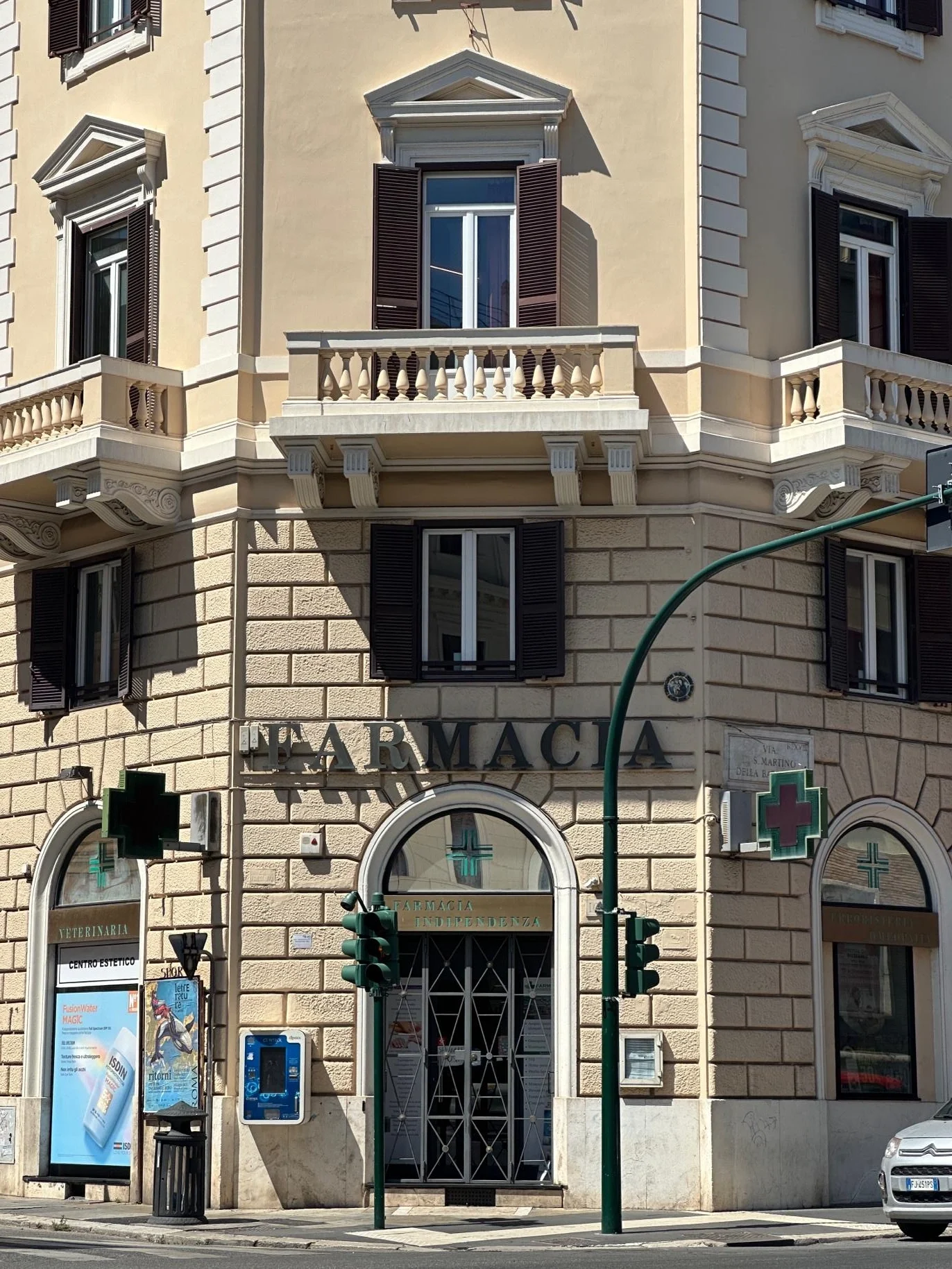
Come funzionano le farmacie in Italia
Le farmacie italiane sono facilmente riconoscibili dalla classica croce verde luminosa. Sono quasi tutte indipendenti e distribuite capillarmente, quindi non è difficile trovarne una, anche in centro città o nei quartieri più piccoli.
Orari di apertura tipici:
Mattina: 8:30 – 13:00
Pomeriggio: 15:30 – 19:30
Dal lunedì al sabato, con orari ridotti o chiusura la domenica. Per sapere quali farmacie sono aperte fuori orario o di notte, puoi consultare il sito Farmacie di Turno Roma oppure usare app dedicate.
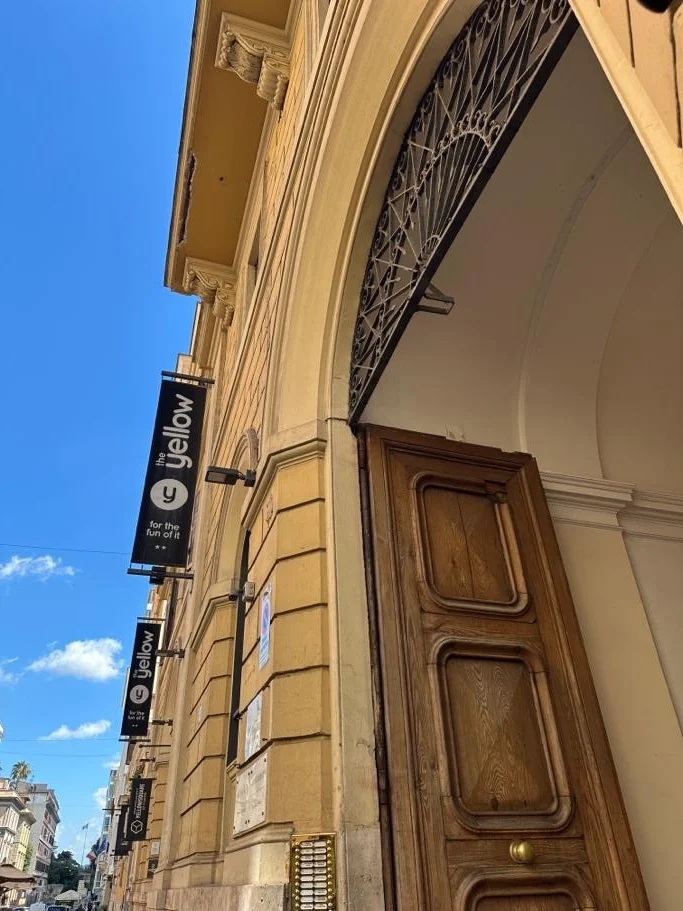

Curiosità culturali:
Cosa aspettarsi quando entri in farmacia
In Italia le farmacie non sono mini-supermercati: non troverai snack, bibite o prodotti vari accanto ai farmaci. Qui il focus è esclusivamente sulla salute.
Molti farmaci da banco (come quelli per raffreddore, mal di testa o digestione) si trovano dietro il bancone, quindi spiega al/alla farmacista quali sintomi hai o che tipo di problema vuoi risolvere.
I/Le farmacisti/e italiani/e sono professionisti/e molto preparati/e, quindi non esitare a chiedere consigli o chiarimenti. A volte possono suggerire anche rimedi naturali o prodotti meno conosciuti.
Parole utili per descrivere i sintomi
Se non conosci ancora bene i termini medici in italiano, ecco qualche parola base per comunicare:
- Raffreddore
- Tosse
- Mal di gola
- Mal di testa
- Febbre
- Nausea
- Diarrea
- Allergia
Puoi semplicemente dire:
“Ho un mal di testa forte, cosa mi consiglia?”
“Ho la tosse da qualche giorno, c’è qualcosa che possa prendere senza ricetta?”
I farmaci più comuni che troverai
Ecco alcuni nomi di medicinali da banco molto diffusi in Italia e a cosa servono:
- Tachipirina: paracetamolo per febbre e dolori lievi
- Moment o Oki: antinfiammatori per dolori articolari, mal di testa, mal di gola
- Enterogermina: probiotico per disturbi intestinali o dopo antibiotici
- Imodium: per la diarrea
- Vicks Tosse: sciroppo per la tosse
Ricorda: gli antibiotici si acquistano solo con ricetta medica.
Cose importanti da sapere
- Non comprare farmaci senza sapere bene a cosa servono: chiedi sempre consiglio al/alla farmacista.
- Se i sintomi durano più di qualche giorno o peggiorano, consulta un medico. Puoi trovare medici che parlano inglese su servizi online come Doctors in Italy.
- Porta sempre con te un documento d’identità: potrebbe servirti per farmaci particolari o in situazioni specifiche.
Farmacie di turno e reperibilità
Quando la farmacia è chiusa, soprattutto di notte o nei giorni festivi, cerca quella di turno — cioè aperta fuori orario — sul sito Farmacie di Turno Roma oppure su app dedicate. Così non rischi di rimanere senza farmaci importanti.
Consigli finali per viaggiare tranquilli
- Porta un piccolo kit con i medicinali di base per i problemi più comuni.
- Impara qualche parola chiave in italiano per descrivere i tuoi sintomi.
- Non farti prendere dal panico: i/le farmacisti/e sono lì per aiutarti!
Link utili
- Farmacie di turno a Roma: https://www.farmaciediturno.org/comune.asp?cod=58091
- Farmacie vicino a YellowSquare Roma: https://maps.app.goo.gl/JYaHNTBKgx2EZLUB7
- Farmacia più vicina a YellowSquare: https://maps.app.goo.gl/8hDhFKSAssMnBjU98
- Medici in Italia che parlano inglese: https://www.doctorsinitaly.com/
Leggi altri post
Roma
Monte Ciocci: Il Tramonto Più Autentico di Roma con Pizza di Bonci
Hai visto il cielo sopra Roma?
Una tappa da aggiungere al tuo itinerario romano — meno citata nelle guide turistiche ma decisamente più locale — è Monte Ciocci.
Questo belvedere panoramico si trova a circa 50 metri sopra la città, in un parco frequentato da famiglie e studenti universitari che si ritrovano qui per un picnic, due accordi di chitarra o semplicemente una birra sui gradini.
Il parco si trova nella zona di Valle Aurelia, vicino a Castel Sant’Angelo, ai Musei Vaticani e alla Basilica di San Pietro; un’ottima idea è dedicare la prima parte della giornata a queste tappe famose e poi salire sulla collina al tramonto per goderti al massimo la golden hour ammirando Roma dall’alto.
La scritta sul muro
“Hai visto il cielo sopra Roma e hai detto quant’è bello, viettelo a vedè dall’alto.”
Questa è la frase che ha reso iconico questo luogo. È un verso della canzone Il cielo su Roma del gruppo hip-hop romano Colle Der Fomento. Un giorno è apparsa come graffito, quasi per caso, ed è diventata il simbolo di questo belvedere. Quando il Comune la cancellò, i residenti reagirono con dispiacere; quando poi qualcuno la riscrisse, tutti festeggiarono!
La seconda parte è in dialetto romanesco. Il significato completo è:
“Hai visto il cielo sopra Roma e hai detto quanto è bello, ora vieni a vederlo dall’alto.”

Questo è ormai uno dei “muretti” più famosi di Roma. Per la sua visibilità, a volte diventa la tela di chi vuole scrivere un messaggio proprio. Non sorprenderti se non trovi la frase: c’è sempre un eroe locale che la ripristina, riportando la scritta più amata dai romani.
Il tramonto
Il belvedere di Monte Ciocci offre uno dei tramonti più belli e insoliti di Roma: è infatti l’unico tramonto che si guarda dando le spalle al sole!
Per via dell’orientamento, soprattutto in primavera ed estate, il sole cala su un lato un po’ spoglio della città. I romani però si siedono sui gradini e guardano dall’altra parte, verso il panorama della città.
Il cielo si colora di sfumature calde, rosa e arancioni, e Roma si apre sotto di te come un dipinto. In quel momento capisci perché la chiamano Città Eterna: sembra davvero che il tempo si fermi, proprio come canta Antonello Venditti in Roma Capoccia, un vero inno alla città.
Il Pizzarium
Un consiglio: abbina al tramonto un’esperienza gastronomica famosa nel mondo ma autenticamente romana: la pizza di Bonci!
Il locale si chiama Pizzarium e si trova vicino alla fermata Cipro della metro A (Via della Meloria, 43).
Gabriele Bonci è considerato il re della pizza al taglio. Nel 2024, ai Pizza Doc Awards, ha vinto il premio Absolute Excellence — “Assegnato per aver rivoluzionato il concetto di pizza al taglio, trasformandola in un’esperienza gastronomica straordinaria”.

Il bancone offre sempre nuove varietà, perché gli ingredienti sono stagionali e lo chef ama sperimentare. Ma il mio consiglio è di assaggiare le pizze più semplici: bianca, rossa, margherita e patate. Il segreto della pizza al taglio più buona del mondo non è nei condimenti, ma nell’impasto.
Come arrivare
Per raggiungere il belvedere bisogna salire una scalinata nascosta e poco curata, dietro un distributore di benzina. È ripida e spesso coperta di erbacce, ma proprio questo dettaglio dona al luogo un fascino avventuroso e lo rende una vera hidden gem.
Non scoraggiarti: tieni stretta la tua pizza e affronta i gradini. Roma, in tutta la sua bellezza, ti sta aspettando!

Posizione esatta della scalinata: Google Maps
Colonna sonora per il tramonto
- Roma Capoccia – Antonello Venditti
YouTube |
Spotify - Il Cielo su Roma – Colle der Fomento
YouTube |
Spotify
SEO Keywords: Roma tramonto Monte Ciocci pizza Bonci hidden gem
Leggi altri post
Roma, Travel
Tour Yourself on, Rome
(Un viaggio tra pellegrini, poeti e sognatori, seguendo il filo dorato del Tridente)
Roma: il piacere di perdersi… e il dono di ritrovarsi
Ma quanto è bello perdersi tra le stradine di Roma?
È proprio una passeggiata nel piacere della scoperta: è innegabile il magnetismo delle inaspettate meraviglie in cui ci imbatteremo.
Tuttavia, dopo anni vissuti qui, devo ammettere che è ancora più bello “non perdersi”, ma piuttosto sapersi ritrovare, utilizzando come guida la connessione segreta tra piazze, chiese e monumenti.
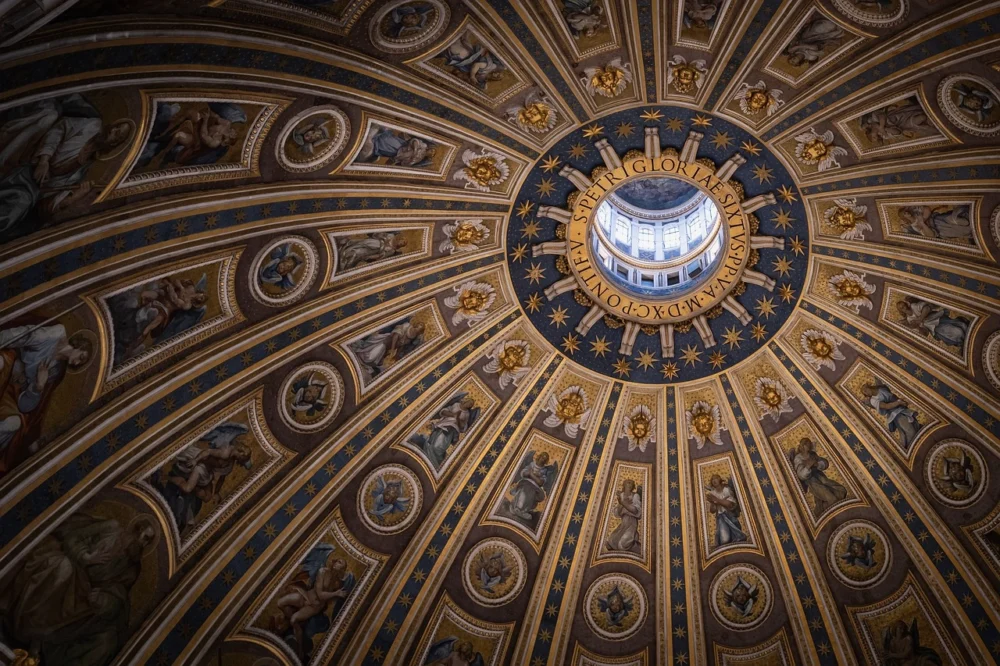
Un piccolo tuffo nella storia: il Concilio di Trento e la Roma che cambia
Mentre ci muoviamo di chiesa in chiesa come pellegrini moderni, vale la pena ricordare che questo modo di vivere la città ha radici profonde nella storia. Dopo il Concilio di Trento (1545-1563), la Chiesa cattolica, nel pieno della Controriforma, decise di rinnovare non solo la propria dottrina ma anche il volto stesso delle città. A Roma, questo significò un vasto programma di costruzione e ristrutturazione di chiese, pensate come strumenti visibili di fede e potere.
Non solo: per guidare i fedeli verso questi nuovi templi della spiritualità, vennero rettificate e create nuove strade, spesso allineando gli assi viari proprio in funzione dei luoghi di culto. È anche grazie a questo impulso che nacquero opere monumentali come il Tridente — l’incrocio perfetto tra fede, urbanistica e bellezza — e molte delle piazze che oggi esploriamo. Così, mentre camminiamo, ripercorriamo inconsapevolmente anche il disegno di un’epoca che voleva guidare le anime… con strade dritte verso il cielo.
E proprio come facevano i pellegrini nei secoli passati: andare di chiesa in chiesa, camminando con la meraviglia negli occhi, proprio come i primi “turisti” della storia.
E allora, iniziamo anche noi dalla “porta delle porte di Roma”: Porta Flaminia, meglio conosciuta come Porta del Popolo.
Appena attraversata, davanti a noi si apre Piazza del Popolo con il suo iconico Tridente: tre strade che si diramano come i denti di un forcone in un grande progetto urbanistico realizzato nel XVI secolo.
Prima di partire, però, soffermatevi ad esplorare bene la piazza: è piena di sorprese.
Dalle pareti che trasportano la voce come un’eco misterioso, ai capolavori di Caravaggio custoditi nella Chiesa di Santa Maria del Popolo, fino al piccolo ma curioso Museo Leonardo da Vinci Experience.
E poi, naturalmente, non dimentichiamo che questa piazza è ancora oggi luogo di raduni popolari: eventi, manifestazioni e proteste possono regalarvi un’esperienza viva e autentica della città.
E ora, parliamo del Tridente. Per guidarci useremo una metafora culinaria: ogni strada sarà come un pasto della giornata — colazione, pranzo e aperitivo/cena.
Pronti a vivere Roma come veri pellegrini… e anche un po’ come poeti e pittori romantici?
Babuino a Colazione
Iniziamo il nostro cammino imboccando Via del Babuino, perfetta per una passeggiata energica verso i Monti.
Immaginate di essere nel 1800: un poeta romantico, flâneur, che si lascia ispirare dall’aria antica e nuova di Roma.
Poi tornate al presente e date un’occhiata ai prezzi dietro le vetrine: siete nel cuore del quartiere del lusso romano!
Lungo il cammino, scopriamo un gioiello: Canova Tadolini, un antico atelier di scultura fondato nel 1818, oggi trasformato in un ristorante-museo.
Qui, i tavoli sembrano ospiti secondari rispetto alla maestosità delle sculture che vi circondano. Un luogo magico, dove si respira arte ad ogni angolo.
Pochi passi ancora, ed eccoci a Piazza di Spagna, con la celebre Fontana della Barcaccia scolpita dai Bernini e, naturalmente, la spettacolare Scalinata di Trinità dei Monti.
Una salita che è un vero banchetto per gli occhi, culminando nella vista panoramica dai balconi di Trinità dei Monti, da dove Roma si svela sotto di voi come un dipinto infinito.
Proseguiamo a destra lungo Via Sistina, che ci conduce verso Piazza Barberini, dominata dalla Fontana del Tritone del Bernini.
Poco più avanti, incontriamo un capolavoro nascosto: Le Quattro Fontane e l’omonima chiesa di Borromini, un incanto di barocco tascabile.
Se continuiamo dritti, arriviamo alla maestosa Basilica di Santa Maria Maggiore, una delle quattro basiliche papali.
Proprio di fronte, potete concedervi una meritata colazione in uno dei caffè della zona: un cappuccino e un cornetto vi restituiranno le forze per continuare l’esplorazione.

Attraverso Monti verso il Colosseo
Dalla Basilica di Santa Maria Maggiore, osservate la mappa: da qui partono quattro strade che si irradiano verso altri monumenti e piazzette.
Prendiamo Via Urbana per entrare nel Rione Monti, uno dei quartieri più affascinanti di Roma, dalla storia multiforme: da primo rione romano a ghetto ebraico medievale, fino ad oggi, cuore pulsante dell’arte e della creatività urbana.
Passeggiate senza fretta fino a Piazza della Madonna dei Monti, il “salotto” del quartiere, e preparatevi: a pochi passi di distanza, il Colosseo si affaccerà davanti a voi, come un antico gigante che vi dà il benvenuto.
Il percorso continua attraverso i Fori Imperiali, un viaggio emozionante nella Roma antica, fino ad arrivare all’imponente Altare della Patria (Vittoriano).
Da lì, voltatevi indietro: vedrete, in lontananza, Piazza del Popolo. Come in un filo invisibile, le strade del Tridente continuano a collegarci.
Una Corsetta a Pranzo vicino al Corso?
Se l’appetito si fa sentire, è il momento giusto per un pranzo!
Potete scegliere se essere trattati da re in un ristorante elegante oppure vivere un’esperienza più “verace” in un’osteria tipica, dove il brusio e il calore romano vi avvolgeranno.
Un esempio perfetto? La storica Birreria Peroni, dove ancora oggi si respira l’atmosfera genuina di un pranzo tra amici.
Non sorprendetevi se, dopo il pasto, vi chiederanno gentilmente di lasciare il tavolo: fa parte del rito romano del “mangia e passa”!

Aperitivo a Trastevere: Bohémien per una Sera
Dopo il pranzo, se desiderate immergervi in una delle tradizioni più celebrate dell’italianità, l’aperitivo è un must!
E il quartiere ideale per farlo è senza dubbio Trastevere, al di là del Tevere.
Il percorso per arrivarci è un sogno: passando per il maestoso Pantheon, la spettacolare Piazza Navona, il solenne Palazzo Madama, fino a raggiungere la Basilica di Sant’Agostino in Campo Marzio, dove potrete ammirare la celebre “Madonna dei Pellegrini” di Caravaggio.
Questa chiesa, tra l’altro, è allineata visivamente con Piazza del Popolo, segno che ancora una volta il Tridente ci guida senza farci smarrire.
Attraversate poi l’Isola Tiberina, luogo leggendario, considerato uno dei primissimi insediamenti di Roma antica.
Da lì, un ultimo tratto di cammino vi porta finalmente a Trastevere, dove vi suggerisco di prenotare un ristorante tipico (magari per gustare una cacio e pepe o una amatriciana da sogno).
In attesa della cena, con uno spritz in mano — sì, in Italia è consentito bere per strada fino alle 22! — godetevi una passeggiata senza meta tra le viuzze illuminate da lanterne.
In Piazza Trilussa troverete sempre artisti di strada, musicisti, mimi: è il cuore bohemien di Roma, dove la semplicità convive con la bellezza antica.
Spegnete la mente per un attimo: ascoltate i suoni, osservate i colori, respirate l’atmosfera.
Capirete che, nonostante i secoli, nulla è cambiato: Roma è ancora quel crocevia eterno di popoli, lingue, sogni e poesia.
Approfondimenti e Fonti Online
.https://it.wikipedia.org/wiki/Urbanistica_a_Roma_tra_il_1870_e_il_2000
.https://www.pexels.com/it-it/cerca/roma%20piazza%20del%20popolo/
Leggi altri post
Roma
Gaeta: una fuga perfetta tra mare, natura e leggenda
Gaeta: una fuga perfetta tra mare, natura e leggenda
A meno di due ore da Roma, Gaeta è la destinazione ideale per una giornata fuori porta che unisce natura, cultura e gastronomia.
Situata tra il Lazio e la Campania, questa cittadina costiera offre panorami mozzafiato, spiagge dorate e tradizioni culinarie dai sapori autentici.
Come arrivare a Gaeta da Roma
In treno + bus
Il modo più comodo per raggiungere Gaeta è con un treno regionale da Roma Termini a Formia-Gaeta, una tratta di circa 1 ora e 15 minuti. Dalla stazione, prendi un autobus urbano (linea C o U) che in circa 15-20 minuti ti porta direttamente al centro. Oppure opta per taxi o car sharing.
In auto
Se hai voglia di un piccolo road trip, percorri la SS7 Appia verso sud: in meno di due ore sei a destinazione. Fermati lungo la costa per un caffè con vista o qualche foto panoramica.
Esplora la Montagna Spaccata e la Grotta del Turco
Comincia la giornata salendo al Monte Orlando. Qui trovi il Santuario della Montagna Spaccata, dove la natura incontra leggenda e spiritualità.
Le tre fenditure nella roccia si dice si siano formate alla morte di Cristo. All’interno, una piccola chiesa scavata nella pietra è luogo di raccoglimento e fede.
Scendendo 35 gradini, si raggiunge la Grotta del Turco: uno stretto canyon dove il mare crea giochi di luce spettacolari. La leggenda della Mano del Turco ti farà osservare la roccia con altri occhi!

Pranzo vista mare con la tiella
Non puoi lasciare Gaeta senza aver assaggiato la tiella, una torta rustica salata cotta al forno e servita tiepida o fredda.
La versione più amata è con polpo, olive nere di Gaeta, pomodoro, aglio e prezzemolo, ma ci sono anche varianti con scarola, cipolla o alici.
Provala da “Antico Forno Giordano” o “La Tielleria”, due locali consigliati anche dai residenti. Meglio ancora gustarla sul lungomare!

Scopri la Cappella d’Oro
Dopo pranzo, addentrati nel centro storico per trovare il Santuario della Santissima Annunziata. Al suo interno, c’è una piccola gemma nascosta: la Cappella d’Oro.
Costruita nel XIV secolo, è un capolavoro barocco con stucchi dorati, dipinti e un soffitto che sembra brillare di luce propria. L’altare ospita una raffigurazione dell’Immacolata realizzata da Scipione Pulzone.

Rilassati alla Spiaggia di Serapo
Per concludere la giornata, dirigiti verso Serapo, la spiaggia più amata di Gaeta.
A due passi dal centro, questa spiaggia è perfetta per rilassarsi, nuotare o fare snorkeling. L’isolotto “Nave di Serapo”, legato a miti greci, è un angolo affascinante e ricco di biodiversità.
Con un po’ di fortuna, potresti vedere il tramonto colorare le scogliere di Monte Orlando di rosa.

Sono stata a Gaeta l’estate scorsa e mi ha conquistata. Tra mare cristallino, leggende e tradizioni locali, è stata una giornata indimenticabile.
Ma Gaeta è solo una delle tante bellezze della costa laziale. Se hai tempo, esplora anche Sperlonga o dedica un weekend all’intera zona. Un’occasione perfetta per staccare dalla città.
Goditi il sole! 🌞
Leggi altri post
Roma
Dove Vedere Caravaggio Gratis a Roma
Vivo a Roma da un po’ di tempo ormai, e questa città non smette mai di incuriosirmi! A volte io e il mio ragazzo torniamo in posti che già conosciamo per ricordare vecchi fatti storici. A Roma non si finisce mai di imparare cose nuove e interessanti.
Questa volta è toccato a Caravaggio. Mi ricordavo di aver fatto un tour su di lui quando stavo imparando l’italiano nel 2018. Un giorno del 2024, il mio ragazzo mi ha detto:
“Che cosa sai di Caravaggio? Lo sai che ci sono capolavori gratuiti da vedere in giro?”
E io: “Sì! Ma non mi ricordo come si arriva in tutti i posti… proviamo!”
Visto che non mi ricordavo bene l’intero itinerario, dopo aver trovato la strada, ho deciso di scrivere dei consigli rapidi per me e i miei amici. Quegli appunti sono poi diventato questo articolo per YellowSquare, visto che uso sempre quel posto come punto di partenza.
Evviva, così non lo dimenticherò la prossima volta =)
Scopri Caravaggio gratis a Roma con una passeggiata
Chi era Caravaggio?
Michelangelo Merisi da Caravaggio, pittore rivoluzionario del Barocco, ha lasciato un segno indelebile a Roma con il suo uso drammatico di luci e ombre. La città eterna conserva alcune delle sue opere più grandi, e la parte migliore? Molte si possono vedere gratis! Segui questo tour a piedi autoguidato per scoprire i capolavori di Caravaggio nelle chiese del centro storico di Roma.
Punto di partenza del tour gratuito
Ho usato YellowSquare Rome come punto di partenza per orientarmi, dato che è centrale e vicino alla Stazione Termini, dove parcheggio sempre l’auto e prendo un caffè. Quindi sentiti libero di prenderne uno anche tu al Yellow Bar. Da lì ci dirigiamo verso la prima chiesa in Piazza Navona, nel cuore del centro storico. A me piace camminare, ma puoi controllare anche autobus e metro vicine.
1. San Luigi dei Francesi
Indirizzo: Piazza di San Luigi de’ Francesi, 00186 Roma – Cappella Contarelli
Orari: Tutti i giorni 09:30–12:15, 14:30–18:30
Una breve passeggiata da Piazza Navona ti porta alla chiesa nazionale francese di Roma. All’interno della Cappella Contarelli troverai uno dei trittici più famosi di Caravaggio:
- La Vocazione di San Matteo (1599–1600)
- L’Ispirazione di San Matteo (1602)
- Il Martirio di San Matteo (1599–1600)
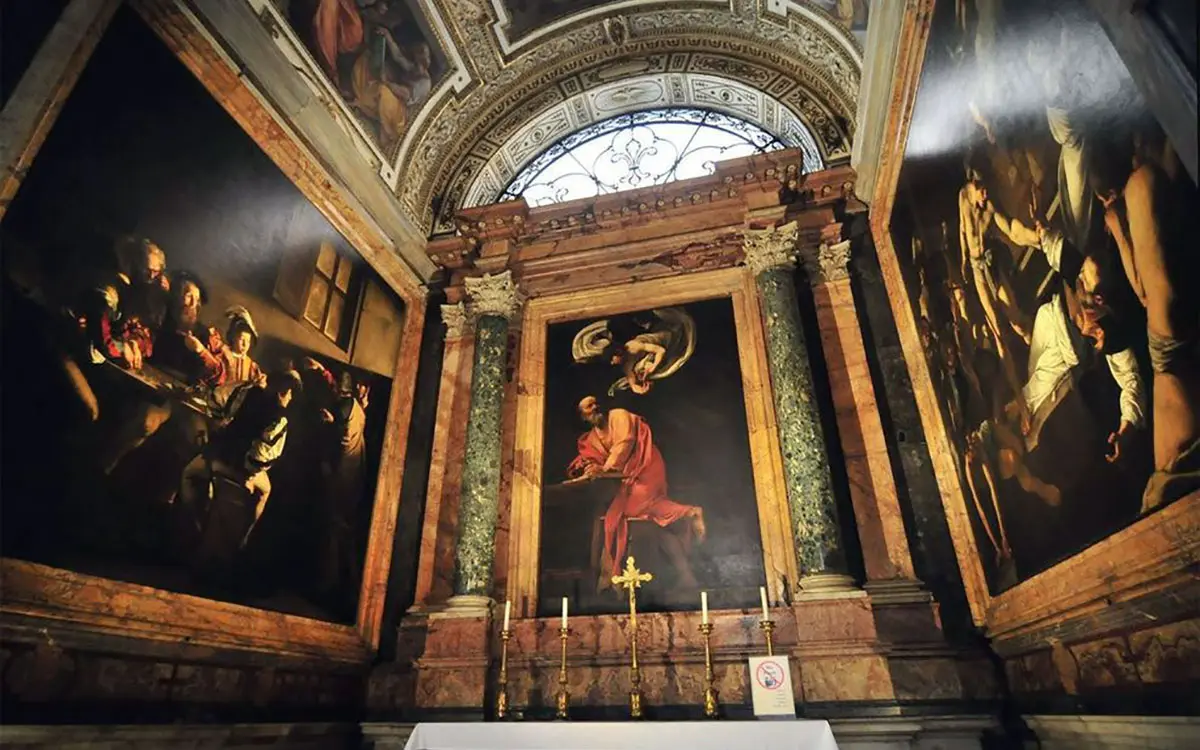
Questi dipinti mostrano momenti chiave della vita di San Matteo con un realismo intenso. L’ingresso alla chiesa è gratuito, ma si consiglia una piccola donazione per accendere le luci sui dipinti.
2. Sant’Agostino
Indirizzo: Piazza di Sant’Agostino, 00186 Roma
Orari: Da lunedì a sabato 09:00–11:30, 16:00–17:00 / Domenica: 16:00–17:00
A pochi minuti di distanza si trova la chiesa di Sant’Agostino, dove si può ammirare la Madonna di Loreto (1604–1606).
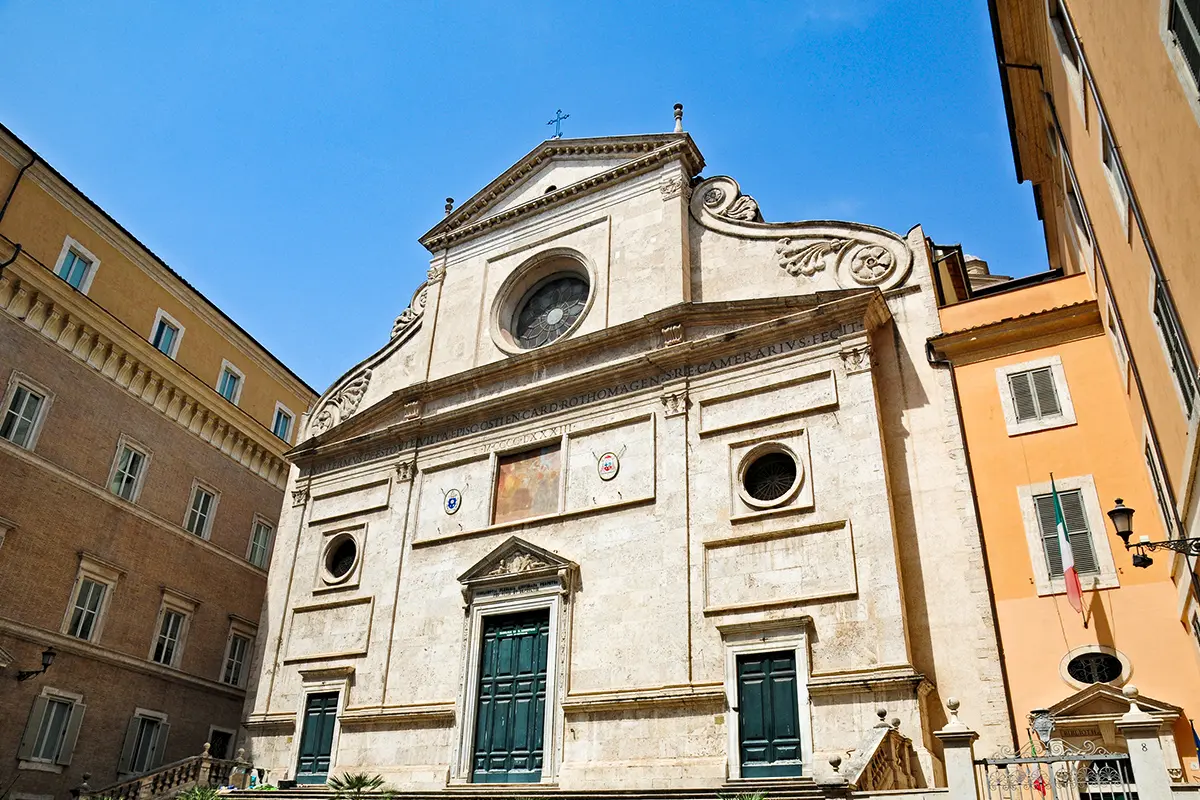
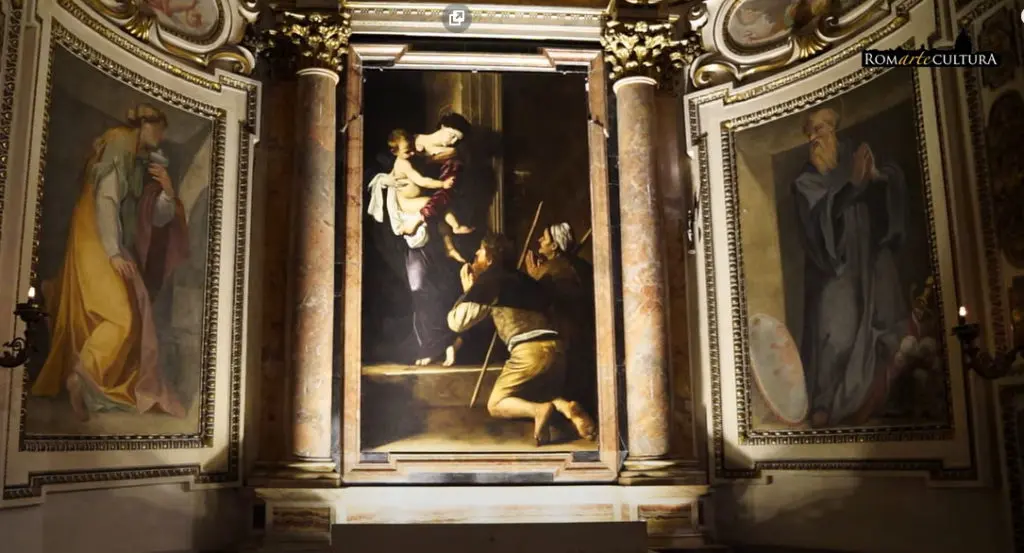
Questa rappresentazione non convenzionale della Vergine Maria, con piedi scalzi e texture realistiche, ha scandalizzato all’epoca. Il dipinto si trova vicino all’ingresso, sul lato sinistro della chiesa.
3. Curiosità su Caravaggio a Roma
La sua casa, la taverna e la scena del crimine
Dove viveva a Roma
Indirizzo: Vicolo del Divino Amore, vicino a Piazza Navona
Caravaggio ha vissuto in vari luoghi a Roma. Una delle sue residenze conosciute era nei pressi di Piazza Navona. Era spesso coinvolto in risse e litigi, che hanno segnato la sua vita turbolenta e la sua arte.
Qui devi fare attenzione: troverai dei cartelli che indicano la direzione della sua casa. In uno stretto vicolo, vedrai un altro cartello con scritto dov’era il suo appartamento. Se è notte, una luce automatica si accenderà per illuminare la via.
Nota la finestra nella foto qui sotto: si crede che Caravaggio usasse luci di questo tipo per studiare meticolosamente il gioco tra ombra e luce. La luce proveniente dall’alto crea un effetto specifico, mettendo in evidenza i soggetti e dando origine al suo stile drammatico.

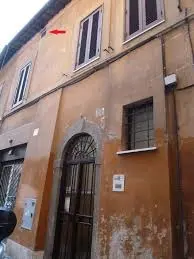
Dove lui si faceva una bevuta con gli altri artisti
Indirizzo: Bar dell’Orso, vicino a Campo de’ Fiori
Caravaggio era noto per il suo amore per il vino, e frequentava spesso le taverne intorno a Campo de’ Fiori. Ma questa “taverna” era molto di più: un punto d’incontro per artisti, ribelli e pensatori che discutevano di arte e società.
Dove ha accoltellato un uomo
Indirizzo: Via della Pallacorda, 00186 Roma
Nel 1606, Caravaggio uccise Ranuccio Tomassoni durante una rissa violenta. Poco dopo fuggì da Roma, iniziando una serie di viaggi irrequieti che influenzarono la sua produzione artistica.
4. Basilica di Santa Maria del Popolo
Indirizzo: Piazza del Popolo, 12, 00187 Roma
Orari: Tutti i giorni 07:30–19:00
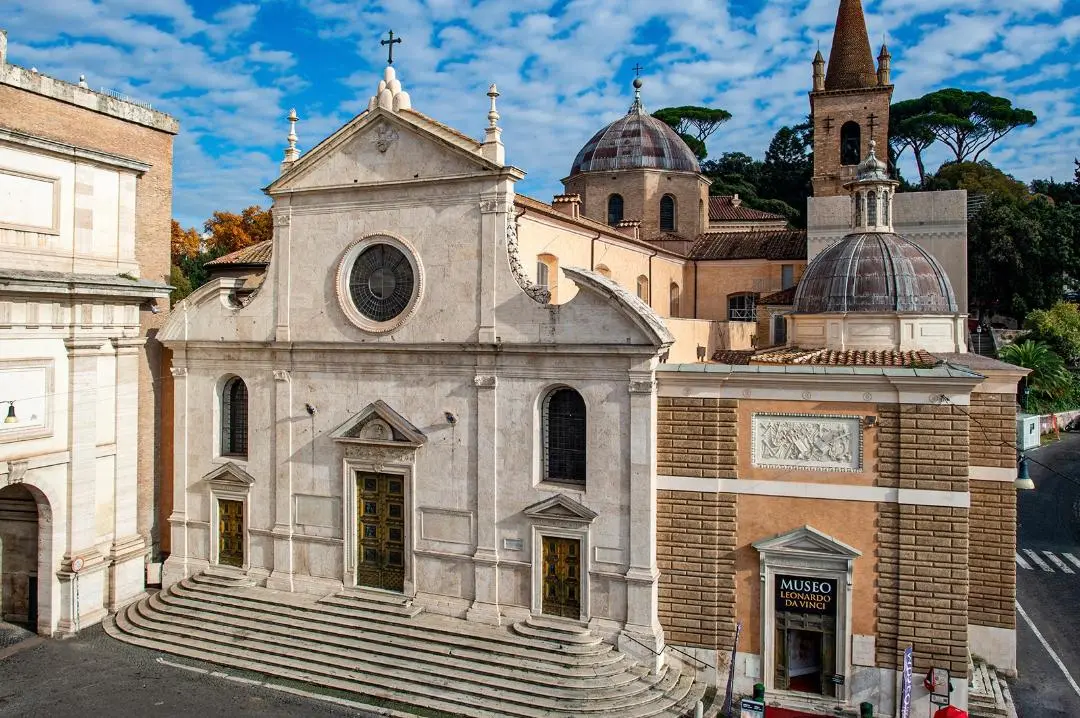
All’interno della Cappella Cerasi, troverai due delle opere più drammatiche di Caravaggio:
- La Conversione di San Paolo (1601)
- La Crocifissione di San Pietro (1601)

Questi dipinti mostrano il suo celebre chiaroscuro: contrasti netti tra luce e ombra.
Consiglio: Vai durante il giorno per sfruttare al massimo la luce naturale.
Questo è tutto per il tour gratuito a piedi…
Ho creato una mappa personalizzata su Google Maps “Where to see Caravaggio for free in Rome“ con l’itinerario che preferisco fare quando esploro la città, e segue proprio il percorso sopra descritto.
Ovviamente puoi modificarlo a tuo piacimento!

Vuoi ancora più Caravaggio?
Se dopo la passeggiata gratuita vuoi vedere altri capolavori, visita questi musei (biglietto richiesto):
- Galleria Borghese
Dopo il tour gratuito puoi salire da Piazza del Popolo, attraversare Villa Borghese e raggiungere la Galleria Borghese.
Indirizzo: Piazzale Scipione Borghese, 5, 00197 Roma
Opere: Fanciullo con canestro di frutta, Davide con la testa di Golia, San Girolamo scrivente
Prezzo: €13–€17 – Prenotazione obbligatoria - Palazzo Barberini
Indirizzo: Via delle Quattro Fontane, 13, 00187 Roma
Opera: Giuditta che decapita Oloferne
Prezzo: €12 – Biglietti online o all’ingresso - Musei Capitolini
Indirizzo: Piazza del Campidoglio, 1, 00186 Roma
Opera: La chiromante
Prezzo: €15–€16 – Disponibili online o in loco - Galleria Doria Pamphilj
Indirizzo: Via del Corso, 305, 00186 Roma
Opere: Riposo durante la fuga in Egitto, Maddalena penitente
Prezzo: €14 – Biglietti online o alla porta
Consigli per il tuo tour Caravaggio a Roma
- Quando andare: Mattina o tardo pomeriggio (per avere la luce migliore dentro le chiese)
- Biglietti: Le chiese sono gratuite; i musei no. Però conferma gli orari di aperture e delle messe.
- Cosa portare: Scarpe comode, acqua e monete per eventuali donazioni
- Trasporti per chi non vuole camminare troppo: Metro linea A, fermata Flaminio (Santa Maria del Popolo) o Barberini (Palazzo Barberini)
Questo tour autoguidato è un bel modo per vivere l’intensità della Roma barocca attraverso gli occhi di Caravaggio, senza spendere un centesimo!
P.S. Ho creato una mappa su Google con questo itinerario salvato sotto il nome “Caravaggio Free Walk” + un livello extra per “Caravaggio’s payed entry”. Ricorda di prenotare in anticipo i biglietti per i musei.
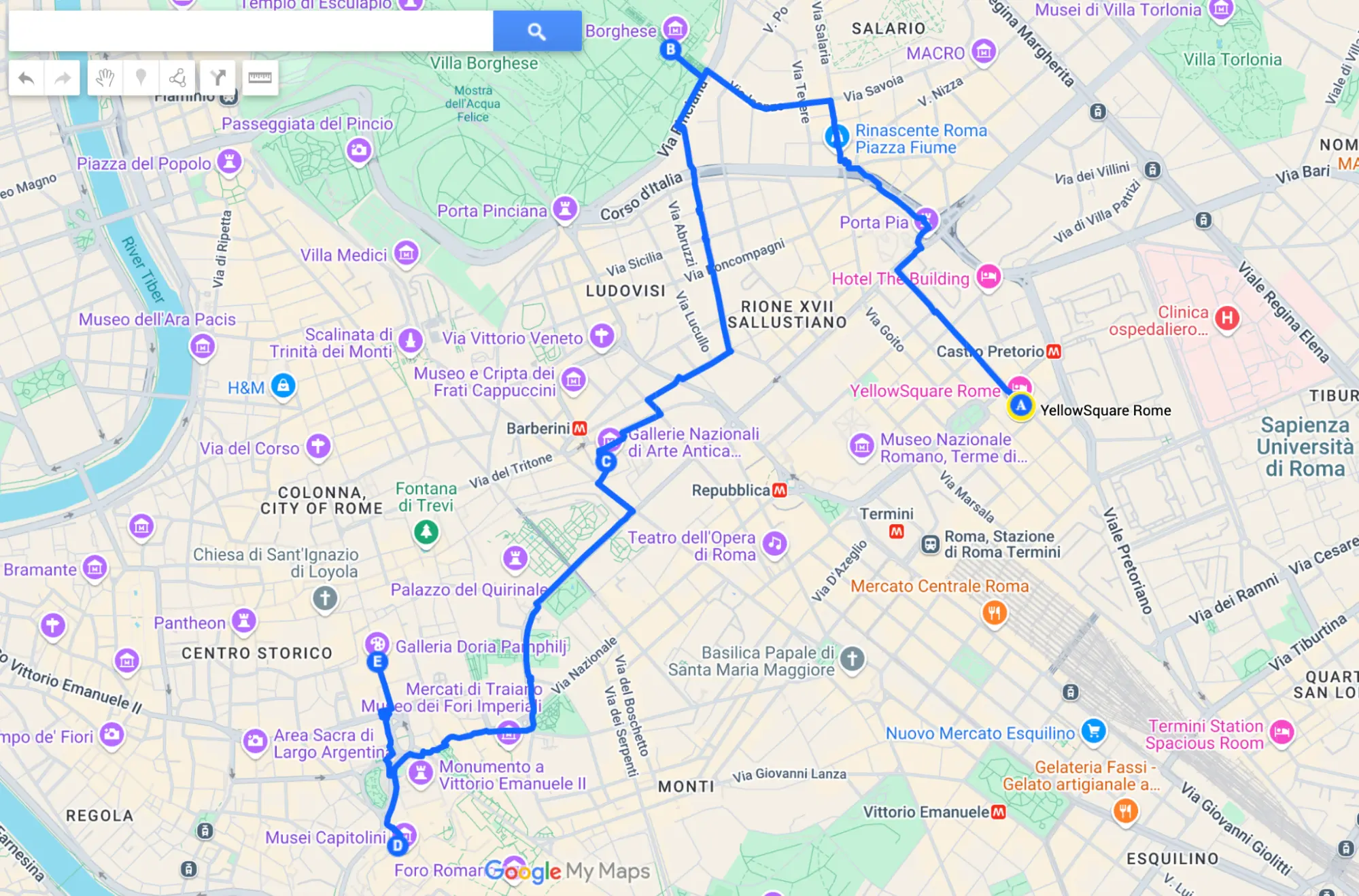
Spero che ti abbia ispirato a esplorare Roma e scoprire meglio la vita e l’arte di Caravaggio.
Buona passeggiata! 🙂
Leggi altri post
Roma
Guida Cinematica di Roma: Grandi film girati in città
La Città Eterna ha affascinato narratori per millenni: dalla Storia di Roma dello storico latino Livio al remake del 2024 di Il Gladiatore con Paul Mescal, Roma continua a occupare un posto centrale nell’immaginario collettivo. Che si tratti del fascino per la violenza dei gladiatori o del profondo significato religioso della città, Roma è stata spesso trasformata in un set cinematografico reale per intrattenere spettatori di tutto il mondo. Durante il tuo soggiorno, prenditi del tempo per visitare questi luoghi dove sono state girate scene iconiche e vivi l’atmosfera del grande cinema.
Film
1) La Dolce Vita, 1960
Girato durante l’“età dell’oro” romana degli anni ’50 e ’60, questo film iconico diretto da Federico Fellini è forse meglio conosciuto per la celebre scena romantica alla Fontana di Trevi. Anche chi non ha mai visto il film potrebbe riconoscere l’immagine di Anita Ekberg, vestita di tutto punto, che entra nelle acque color perla della fontana con Marcello Mastroianni. Anche se potresti essere tentato di emulare la spensieratezza del film, resistere è d’obbligo: il tuffo può costarti una multa di 450 euro. Puoi comunque ammirare gratuitamente Oceanus, i suoi cavalli e il carro a forma di conchiglia. Consiglio: il momento migliore per visitarla è verso l’1:00 di notte, quando è illuminata e i turisti sono spariti.
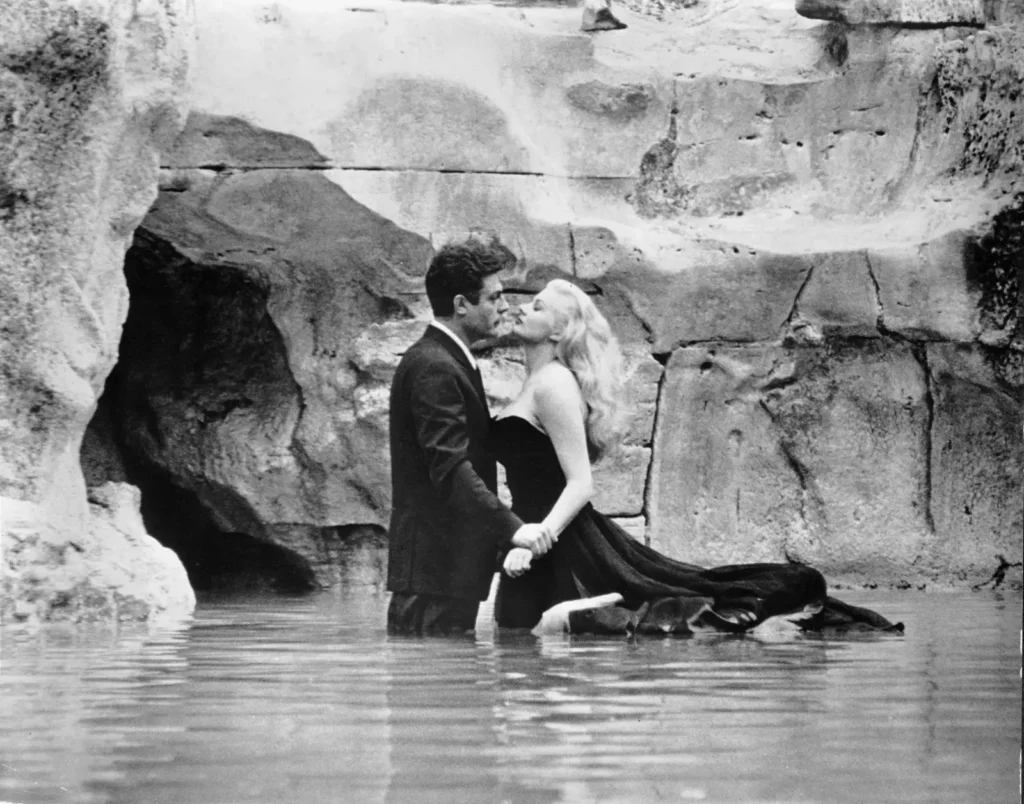
2) Il Talento di Mr. Ripley, 1999
Thriller psicologico girato tra Roma, Venezia e la Costiera Amalfitana, con Matt Damon, Jude Law e Gwyneth Paltrow. La storia si snoda tra bugie, intrighi e tradimenti, con scene ambientate in luoghi iconici come Piazza di Spagna. Questo luogo prende il nome dal Palazzo di Spagna, sede dell’Ambasciata di Spagna presso la Santa Sede. Se ancora non l’hai visto, è un must prima di partire. Unisciti a uno dei tour di Yellow per scoprire questo e altri luoghi leggendari di Roma!

3) Il Gladiatore, 2000
Anche se non è stato girato realmente al Colosseo, questo film epico richiama perfettamente lo spirito dei combattimenti che vi si svolgevano. Russel Crowe e Joaquin Phoenix nella versione originale, Paul Mescal e Pedro Pascal nel remake 2024 diretto sempre da Ridley Scott: in entrambe le versioni, il Colosseo è protagonista assoluto. Consigliamo vivamente di prenotare i biglietti in anticipo per saltare la fila e avere più tempo per goderti Roma!


4) Lizzie McGuire – Da liceale a popstar, 2003
Un classico per molti viaggiatori Gen-Z. Lizzie arriva a Roma per una gita scolastica e finisce per diventare una popstar, innamorandosi di Paolo, un affascinante ragazzo romano. I due sfrecciano su una Vespa rossa attraverso Roma, passando dal Pantheon a Piazza della Repubblica. Un soggiorno in ostello come Yellow è il modo migliore per incontrare persone… e forse anche l’amore!


5) Mangia, Prega, Ama, 2010
Interpretata da Julia Roberts, questa pellicola segue il viaggio interiore della protagonista in Italia, India e Indonesia. A Roma, il tema è ovviamente “Mangia”. Segui il suo esempio: assaggia il gelato artigianale, un bel piatto di spaghetti in piazza, oppure bevi da una nasone in Via dell’Orso, le fontane gratuite che scorrono in tutta la città.
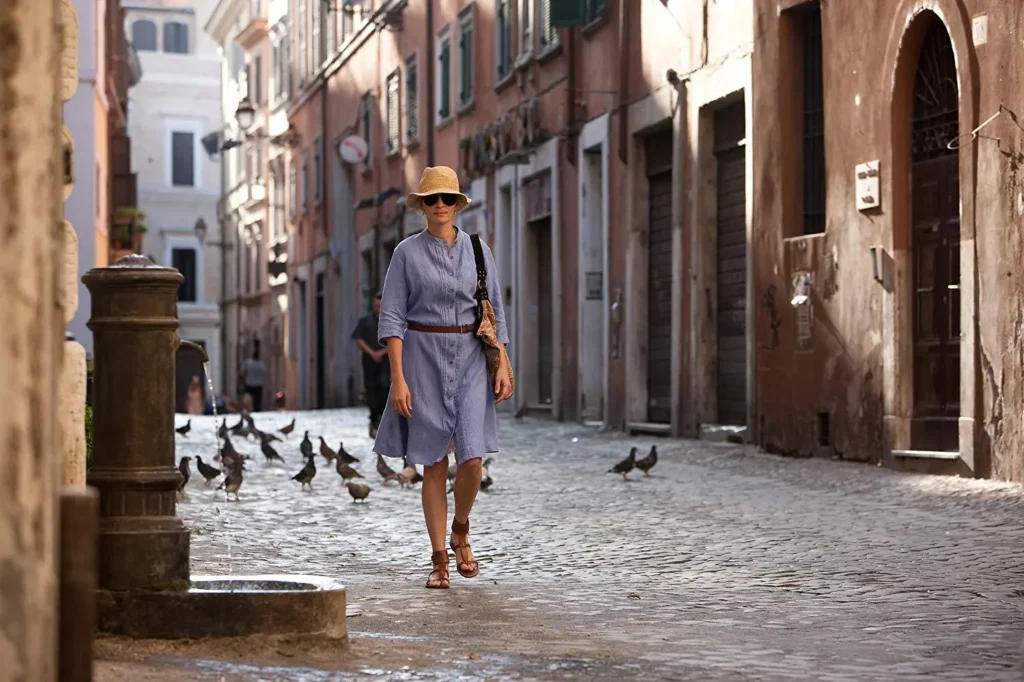
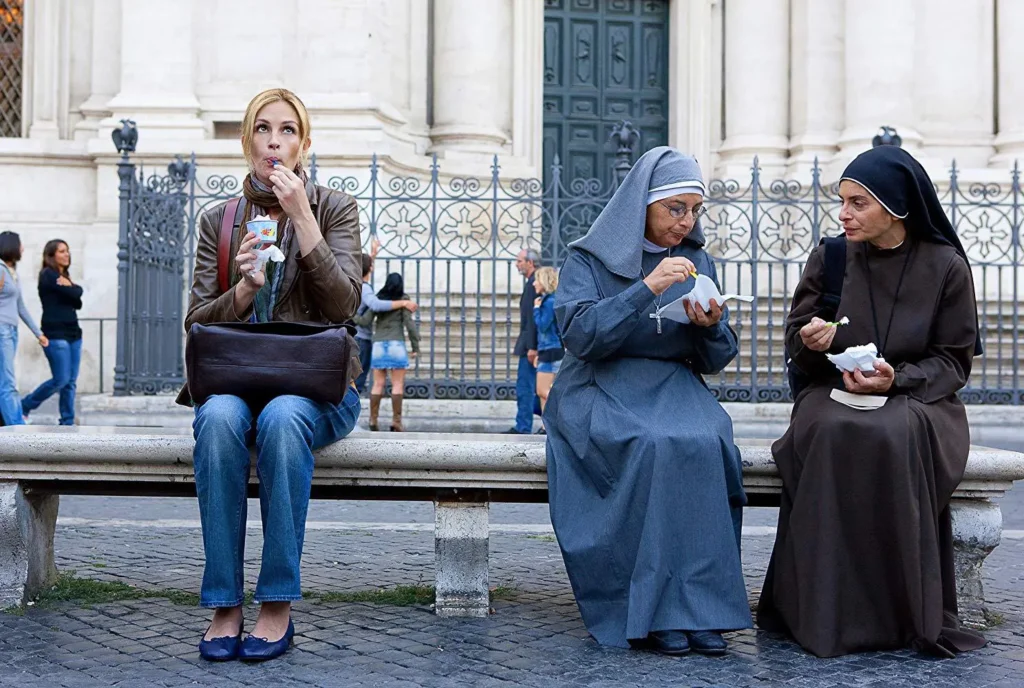
Tutti questi luoghi sono facilmente raggiungibili a piedi, in metro o autobus da YellowSquare Roma, vicino alla stazione Termini. Che tu venga per inseguire le star del tuo film preferito o per iniziare un viaggio trasformativo, a Yellow troverai storie degne del cinema da vivere in prima persona.
Fonti:
https://www.turismoroma.it/it/pagina/la-dolce-vita
https://www.wantedinrome.com/news/italy-rome-tourists-fined-bathing-trevi-fountain.html
https://almostginger.com/the-talented-mr-ripley-filming-locations/
https://www.cntraveler.com/story/where-was-gladiator-ii-filmed
https://www.cineguides.com/the-lizzie-mcguire-movie-2003-filming-locations
https://almostginger.com/eat-pray-love-filming-locations-rome/
https://www.rome.net/piazza-di-spagna
Leggi altri post
Roma
Esplora la scena LGBTQ+ a Roma!
Roma non è solo una delle città più belle del mondo, ma anche una delle più vivaci per la comunità LGBTQ+. Con una scena ricca e variegata, la capitale offre locali accoglienti, serate indimenticabili e un’atmosfera inclusiva. Che tu sia del posto o in visita, questa guida ti aiuterà a scoprire il meglio della vita notturna e dei luoghi gay-friendly della città.
Le due zone più iconiche per la comunità LGBTQ+ sono la Gay Street (vicino al Colosseo) e il quartiere Pigneto. La Gay Street è perfetta per un aperitivo rilassato, mentre il Pigneto, con il suo stile artistico e alternativo, è ideale per chi cerca un’atmosfera più creativa e raffinata.
Con una straordinaria diversità, la città offre una vasta gamma di esperienze: bar, discoteche e persino centri culturali per tutti i gusti e stati d’animo.
Ecco alcuni luoghi imperdibili per goderti il meglio della vita notturna LGBTQ+ a Roma.
Bar e locali
Coming Out
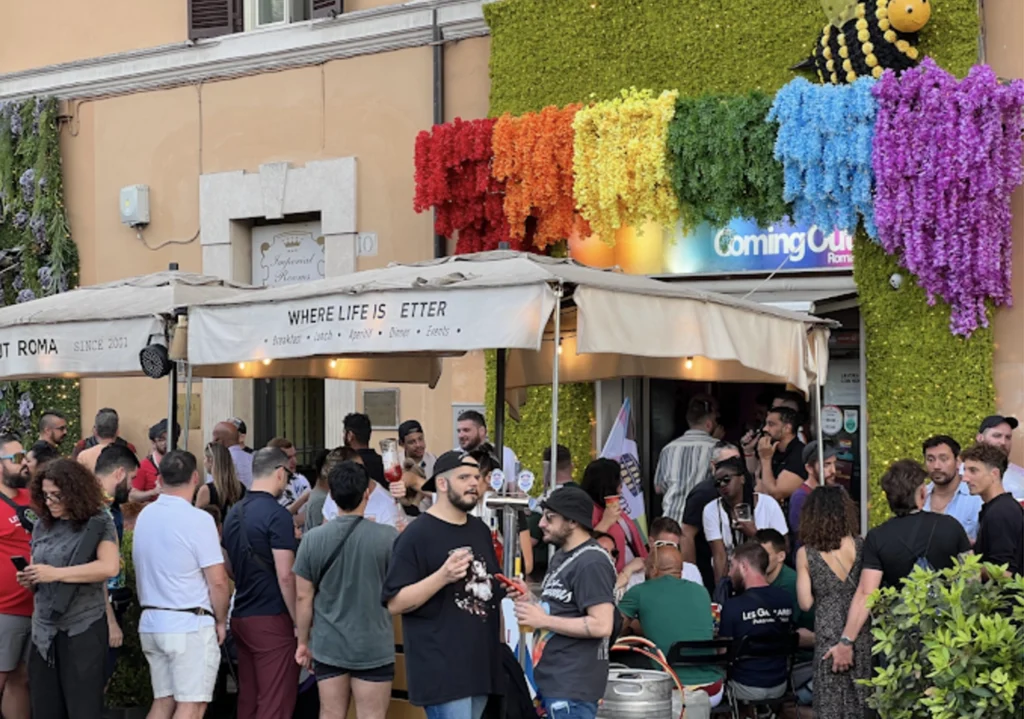
Questo bar ha svolto un ruolo chiave nella trasformazione di Via S. Giovanni in Laterano nella Gay Street di Roma. Nato come un piccolo bar vicino al Colosseo, è diventato ora un punto centrale per la comunità LGBTQ+ della città. Il Coming Out è il luogo perfetto per incontrare nuove persone o semplicemente godersi l’atmosfera unica della Gay Street.
Indirizzo: Coming out
101 Roma Club

Situato tra Termini e il Colosseo, questo locale notturno è perfetto per chi cerca un ambiente rilassato e inclusivo. Puoi socializzare nell’area principale del bar o goderti maggiore privacy nell’intima lounge. Il suo motto dice tutto: “Sii libero di essere te stesso.” Se cerchi un’atmosfera tranquilla e senza giudizi, questo è il posto giusto per te.
Indirizzo: 101 Roma Club
Malo Glitter Bar
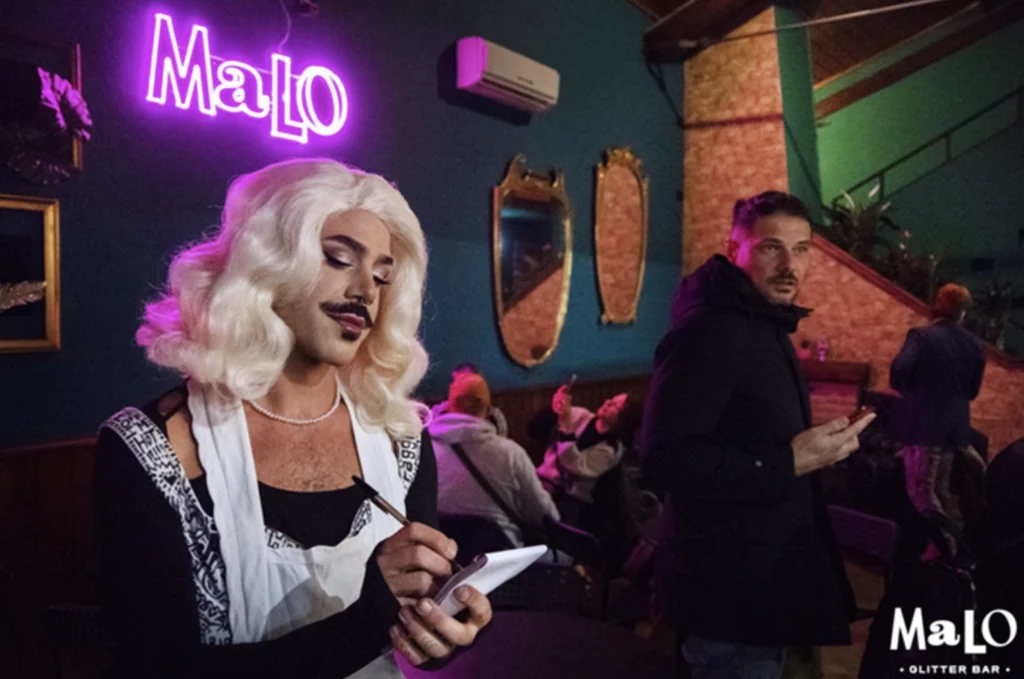
Nel cuore del Pigneto, il Malo Glitter Bar è un mix perfetto di cultura e divertimento. Oltre a servire cocktail unici e di alta qualità, questo locale ospita mostre d’arte, performance di drag queen, presentazioni di libri e talk stimolanti. È uno spazio creativo dove arte e inclusività si incontrano, rendendolo una meta imperdibile per la comunità LGBTQ+.
Indirizzo: Malo Glitter Bar
Dove andare a ballare?
Roma è la città perfetta per chi ama ballare fino a tarda notte. Con una varietà di eventi LGBTQ+, c’è sempre qualcosa in programma. Ecco alcune delle feste più iconiche.
GIAM
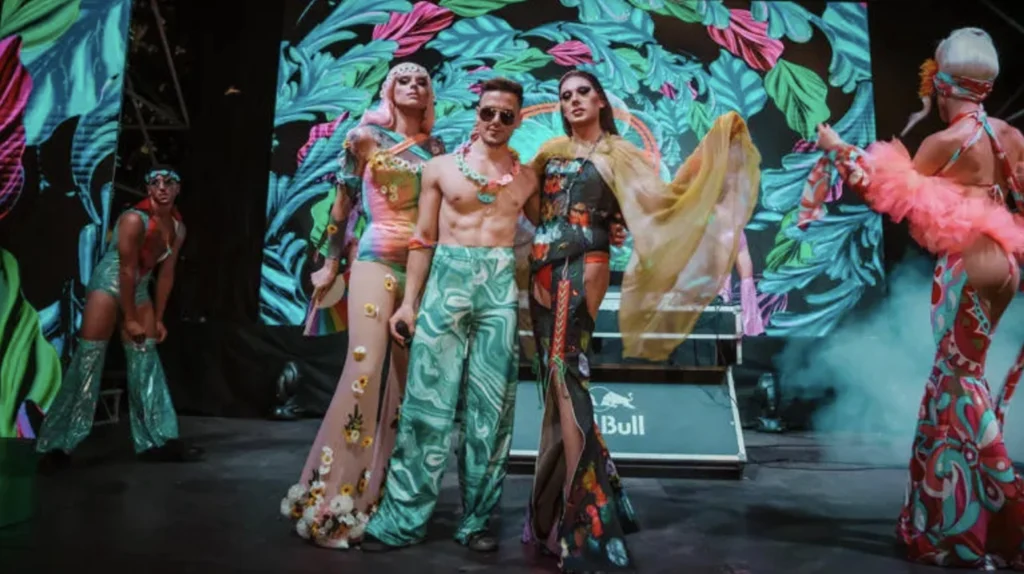
La festa del sabato sera per eccellenza è GIAM! Organizzata al Planet Club nel quartiere EUR, questo evento vede protagonisti DJ internazionali, performer straordinari ed un’energia elettrizzante che illumina le notti di Roma tutto l’anno. Se ami la musica elettronica e le vibrazioni ad alta energia, questa è la festa che fa per te.
Indirizzo: GIAM
POPPE Party
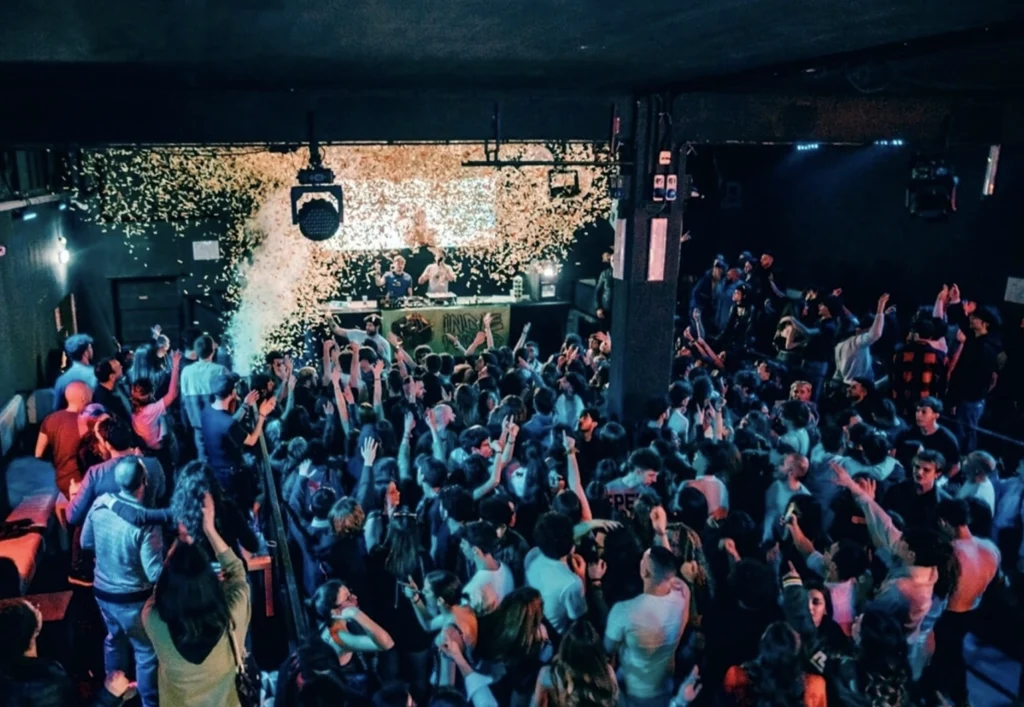
Questo evento queer-friendly celebra la cultura pop in tutte le sue forme. Ogni due sabati al Monk, puoi ballare su ritmi R&B, remix nostalgici e hit del momento, il tutto curato da DJ di alto livello. È la serata ideale per gli amanti della musica pop e per chi cerca un mix di nostalgia e stile moderno.
Indirizzo: POPPE party
Latte Fresco
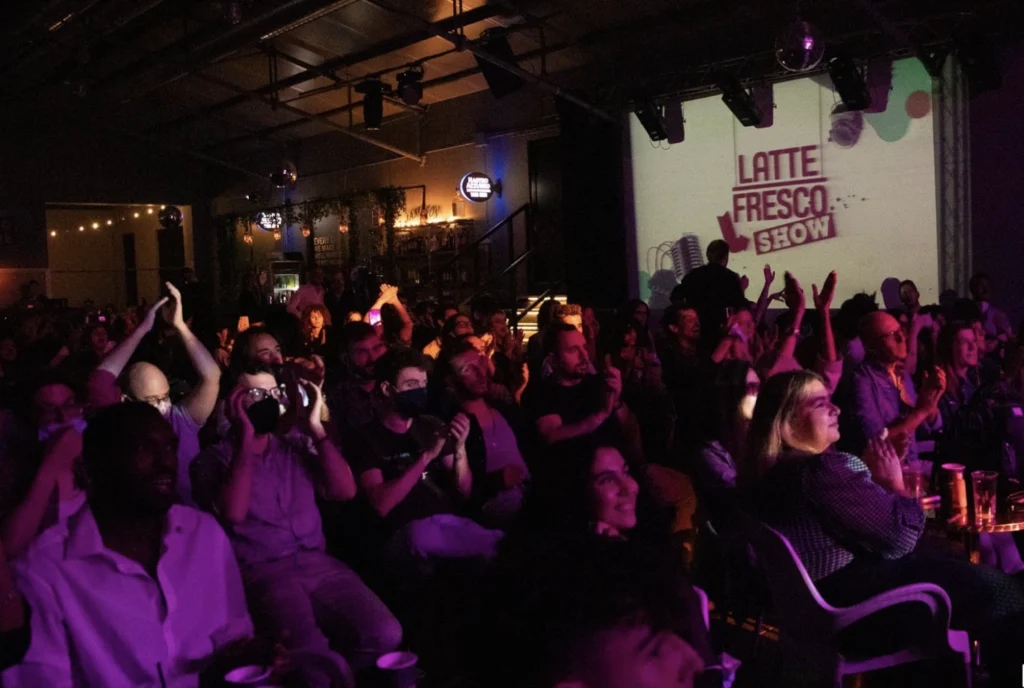
Una delle feste più variegate di Roma si tiene ogni venerdì al Largo Venue. Ogni venerdì puoi goderti un mix di stand-up comedy, karaoke e performance drag prima di mezzanotte, perfetto per sorseggiare un drink con gli amici. Dopo mezzanotte, fino alle 4 del mattino, la pista da ballo prende vita con una vasta gamma di musica, accompagnata da contest dove il pubblico può salire sul palco e ballare insieme ai DJ e alle drag queen.
Indirizzo: Latte Fresco
Più di una semplice notte magica: Cultura e Comunità
Se cerchi qualcosa oltre a drink e balli, Roma offre anche spazi come centri culturali LGBTQ+. Qui puoi partecipare a eventi culturali e attività incentrate sull’attivismo, arricchendo la tua esperienza all’interno della comunità.
Pronto a Scoprire Roma?
Questi sono solo alcuni suggerimenti per esplorare la scena LGBTQ+ di Roma, ma c’è molto di più da scoprire! Esci, divertiti e lasciati sorprendere da una città che sa accoglierti con calore e colore. 🌈✨
Con affetto, Chiara
Leggi altri post
Roma
Roma Gattastica: una guida ai gatti di Roma
Roma, città ricca di storia e cultura, ha un legame profondo con i suoi abitanti felini. I gatti sono parte integrante della vita romana da secoli, e la loro presenza è intessuta nel telaio
della storia e della cultura della città. Vi state chiedendo dove potete incontrarli? Continuate a leggere!
Un duetto perfetto nei secoli dei secoli
Il rapporto tra i Romani e i gatti risale all’alba dei tempi. I Romani erano noti per il loro approccio pragmatico all’allevamento animale e i gatti erano apprezzati per la loro capacità di controllare le popolazioni di roditori. Questo vantaggio pratico cementò il posto dei gatti nella società romana.
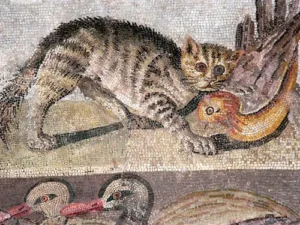
Ma al di là del loro ruolo pratico, i gatti hanno anche un significato culturale a Roma. Nel corso della storia, molti romani famosi hanno espresso il loro amore per i gatti. Un esempio notevole è il poeta Catullo, che scrisse diverse poesie sul suo gatto domestico, Bituitus.
Soprattutto nell’età imperiale, i felini erano considerati sacri dai Romani, influenzati dal culto di Iside, una dea egizia molto venerata a Roma in quel periodo. Iside era spesso raffigurata con un gatto o un cucciolo di gatto sacro, a simboleggiare le sue qualità protettive e di cura.
Gattare romane: una lunga storia d’amore
Il culto di Iside era particolarmente popolare tra le donne, che ricercavano il suo favore in materia di amore, fertilità e maternità.
Questo legame tra gatti e donne si riflette anche nella lingua italiana: la parola gattara è un termine gergale romano che si riferisce a una donna che si prende cura dei gatti randagi. Queste persone dedicate svolgono un ruolo cruciale nella vita della popolazione felina di Roma, fornendo cibo, riparo e cure mediche ai gatti in difficoltà.
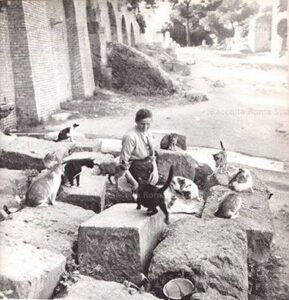
I gatti della Roma moderna
Oggi i gatti continuano a popolare Roma. Si possono trovare a passeggiare nelle piazze storiche della città, a poltrire sui davanzali soleggiati e a esplorare le antiche rovine. Molti romani nutrono un profondo affetto per i gatti e li trattano come membri della loro famiglia.
Ecco alcuni luoghi in cui è possibile incontrarli, o anche sostenerli con donazioni, mentre si ammira il meraviglioso scenario della Città Eterna:
- Piramide Cestia: https://maps.app.goo.gl/p7zLBeKxkQdKdzXu5
L’antica tomba romana di Piramide Cestia è anche un rifugio per una florida colonia di gatti. Questi felini hanno fatto della piramide la loro casa, aggiungendo un tocco di fascino al sito storico. - Porta Magica: https://maps.app.goo.gl/xs7C6V7UHJrQcLJPA
La Porta Magica, un misterioso arco situato nel quartiere Prati di Roma, ospita anche una piccola ma amichevole colonia felina. Spesso li si può vedere oziare sui gradini o esplorare l’area circostante. - Torre Argentina: https://maps.app.goo.gl/5YesZ5ZmA9iUXcwo6
Torre Argentina, un sito archeologico storico di Roma, è rinomata per la sua nutrita colonia felina. Questo gruppo di gatti ha trovato casa tra le rovine dell’antico tempio romani, creando uno spettacolo unico e suggestivo. - Cimitero Monumentale del Verano and Cimitero Acattolico: https://maps.app.goo.gl/ctSfTb9d1V6sqKsk8
Questi due cimiteri di Roma, noti per il loro valore storico e la loro splendida architettura, ospitano anche colonie feline. I gatti hanno trovato rifugio tra le tombe e i monumenti, creando un’atmosfera unica e pacifica.
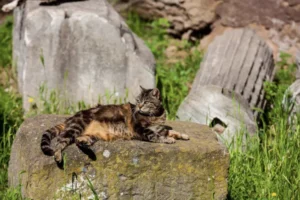
Bonus: CATS – il miao-sical a Roma
L’iconico musical CATS è stato adattato per il pubblico italiano nel 2023 con un caratteristico allestimento romano. Ambientata sullo sfondo della Città Eterna, questa produzione italiana cattura l’essenza dell’originale incorporando elementi della cultura e della storia romana.
Con le antiche rovine romane che fanno da sfondo al palcoscenico, l’ambientazione del musical offre uno scenario accattivante e autentico per il ballo annuale dei Jellicle Cats.
Potrete assistere a questo accattivante spettacolo, per il secondo anno consecutivo, al Teatro Sistina a partire dal 2025.
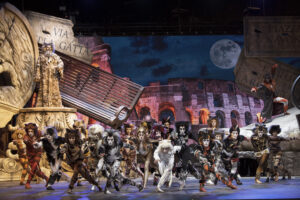
Dove: https://maps.app.goo.gl/vmqf5HZtcmM52A5E6
Il legame tra i romani e i gatti è una testimonianza dell’amore e del rispetto che l’uomo può nutrire per gli animali. I gatti hanno avuto un ruolo fondamentale nella storia e nella cultura di Roma: mentre la città continua a evolversi, la presenza dei gatti rimarrà senza dubbio una parte importante della sua identità.
Leggi altri post
Roma
Sei Mesi Prospettive Roma
Ciao amico! Spero tu stia benissimo! Se stai pensando di venire a Roma per la prima volta, devo ammettere che sono un po’ geloso. Ricordo ancora l’emozione di vedere questa città per la prima volta; mi ha catturato così tanto che ho deciso di restare.
Farò del mio meglio per darti uno scenario di come ho vissuto questa città negli ultimi mesi.
Dove qualsiasi cosa può succedere
Roma è quella città dove può succedere qualsiasi cosa. In un mercoledì qualsiasi, potresti vedere James Franco a Trastevere mentre firma libri, o Harry Styles a Porta Portese mentre compra vinili rari. E se questo non ti sorprende, aspetta la settimana successiva quando Edward Norton (l’altro tipo di Fight Club) presenterà un film in un cinema all’aperto. Ecco Roma per te: una scatola piena di sorprese infinite. Come la definirei? Con una parola: stimolante.
https://www.romeinternational.it/en/edward-norton-in-rome-meet-the-public/https://cinematroisi.it/
“James Franco presenta Spring Breakers a Monte Ciocci”
“Edward Norton a Roma parla del Cinema Italiano al Cinema in Piazza di Roma”
Un Mosaico Culturale
Roma è la Torre di Babele, ma con più sapore e caffè migliore. Qui, le culture non coesistono semplicemente; si abbracciano in un caos delizioso che solo questa città può offrire. Passeggia per le sue strade e ascolterai una sinfonia di lingue, vedrai mercati pieni di prodotti che non sapevi esistessero, e scoprirai trattorie dove ogni piatto racconta una storia. Fidati, Roma è un luogo che avvolge. È un festival di diversità avvolto in un caos perfettamente orchestrato.
Il Cibo: Più di un Cliché
Quando sono arrivato, ricordo di essermi divertito a vedere quella che consideravo una sfilata di nevrotici ossessionati dai dettagli. Ma devo ammettere che quest’ossessione per la precisione culinaria, che è praticamente una questione di cultura generale in Italia, fa sì che lo standard più basso di cibo qui sia eccellente.
E dopo un po’, credimi, impari che il pecorino è sacro, il dibattito guanciale vs pancetta e i loro usi appropriati, colpo di scena (c’è più che solo spaghetti), la pasta deve sempre essere al dente, il pesce e il formaggio possono farti espellere dall’Italia, cosa significa veramente un “caffè normale” e molto altro ancora.
Filosofia Romana in Due Parole: Sti Cazz$
Un giorno stavo parlando con il mio amico Manuele (un chef romano, fedele allo stereotipo) su cosa significasse davvero sti cazz$. Mi ha detto: “È come dire ‘che importa’, ma è più di così.” Ecco come si sopravvive a Roma. La metro è in ritardo? Sti cazzi. La tua cena è arrivata in ritardo? Il cameriere ha sbagliato l’ordine? Sti cazz$. Fondamentalmente, nulla è abbastanza grave da preoccuparsi troppo. Tutto ha una soluzione, e se non ce l’ha… sti cazz$.
(E per favore, non cercare la parola su Google Immagini)
Ci vediamo presto!
Bene, miei compagni viaggiatori, tutte le strade portano a Roma. Ho appena grattato la superficie di ciò che puoi trovare qui, ma fidati, ne vale la pena.
Ci vediamo qui per un aperitivo!
Pura Vida, Ale
Leggi altri post
Roma
Basking in Roman Beach Bliss: 3 Coastal Escapes for Travelers Seeking Sun and Serenity!
Attention, fellow travelers seeking a perfect beach getaway from the enchanting streets of Rome! Look no further, for we have curated an unforgettable coastal adventure that starts right from Termini Station. Hop aboard the train, and let’s set sail for three Roman beach gems that promise sun-soaked relaxation and beachside bliss!
1. Ostia Lido – Where Fun in the Sun Meets Beachside Vibes!
Are you ready for a beach day filled with sun, sand, and endless fun? Hop on the local train to Ostia Lido, a beach haven that promises a lively coastal experience. In less than an hour, you’ll find yourself immersed in a vibrant beach scene, with stretches of golden sands and sparkling blue waters inviting you to dip your toes. Ostia Lido’s charm lies in its lively promenades, beach clubs, and a variety of watersports activities. Whether you’re a beach volleyball enthusiast, a windsurfing daredevil, or simply seeking a leisurely sunbathing session, Ostia Lido caters to every beach lover’s desires. So, pack your favorite beach read, slather on some sunscreen, and get ready for an adventure-packed day in the Roman sun!
2. Santa Marinella – A Tranquil Oasis with a Glimpse of History!
Escape the hustle and bustle of the city with a quick regional train ride to Santa Marinella – a coastal gem that exudes serenity and timeless charm. In just over an hour, you’ll be transported to a seaside oasis, where soft sands and tranquil waters create a dreamy atmosphere. Beyond the relaxing ambiance, Santa Marinella offers a touch of Roman history with the remnants of ancient villas overlooking the coastline. Embrace the laid-back vibe, take a refreshing dip in the clear waters, and let the picturesque surroundings soothe your soul. This Roman beach retreat is perfect for travelers
3. Anzio – Seaside Dreams and Nautical Adventures Unite!
Prepare for a coastal escapade like no other as you board a hidden gem that offers the best of both worlds. Within an hour, you’ll find yourself in a charming town with serene beaches and an array of nautical delights. Anzio’s tranquil shores invite you to unwind and soak in the coastal serenity. Whether you’re strolling along the sandy shores or savoring a refreshing cocktail with a view, Anzio is the perfect spot to slow down and embrace the beach vibes. For the adventurous souls, head to the nearby port and embark on a nautical adventure, exploring the captivating coastline from the sea.
So, dear travelers, Rome’s coastal wonders are yours to explore! From the bustling shores of Ostia Lido to the serene sanctuary of Santa Marinella and the nautical delights of Anzio, these Roman beach escapes promise an unforgettable seaside experience. Pack your beach essentials, let your cares drift away with the waves, and revel in the sun-kissed bliss that awaits you on Rome’s stunning coastline!
